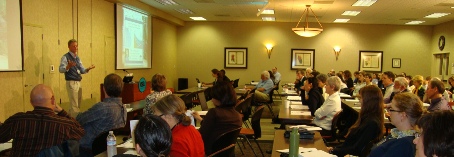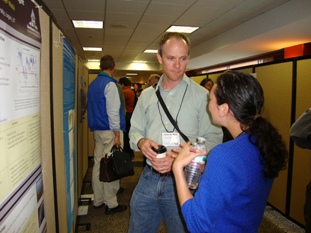A Conference about Water III: Perceptions of Water Use
Yesterday’s morning sessions at the ESA Millennium Conference on water and drought wrapped up the keynote talks and moved into posters showcasing social and ecological studies surrounding water use.
Denise Fort, a professor of law at the University of New Mexico, gave an overview of water law and the tradeoffs that occur when ecosystem health is at odds with human demands. She touched on an interesting case against the Endangered Species Act involving the fifth amendment, where landowners have made the case that laws affecting use of their land, such as using less water or changing their agricultural practices, is equivalent to the government “taking” their land. In these cases, she said, we need to figure out an appropriate compensation for these landowners, possibly in the form of ecosystem services.
Fort also made a point that would come to be a recurring theme in conversations later on in the day: the use of the word drought. She pointed out that in many cases, a social drought such as those that have affected the Southwest or the Southeast is actually not a meteorological drought, or one that includes an unprecedented water scarcity. Nevertheless, she said, managing water scarcities needs to have a large measure of adaptation. “We’re not likely to return to average or normal,” she said. “If we keep doing what we’ve been doing in the past, it’s extinction for many species.”
Likewise, in his talk, Todd Rasmussen of the University of Georgia told the audience that in most other cultures, the concept of the “American Way of Life” is not translated into their language, but instead said in English. This idea of water inequity is one of the foundational concepts of the conference, and one that will probably be explored more in the conference workshops.
The poster session was another lively event, with researchers presenting their work on water scarcity and mitigation efforts from around the world. Lisa Welsh of Utah State showcased her work on the perception of drought in the Bear River Basin in the West. This basin feeds several divisions in different ways, and Welsh found that the divisions are good predictors of people’s attitudes toward their water. In divisions where water is traditionally abundant, people are not as worried and in many ways are more vulnerable, Welsh says. But in water-scarce regions, the people are much more ready to deal with an impending drought.
Stay tuned for a virtual tour of the Gwinnett Water Treatment Plant (seriously, it was really fun) and their LEED-certified Environmental and Heritage Center.

